#particularly the short loops are very impressive to me. and the way the dungeon loop and sim loop work together so well.
Explore tagged Tumblr posts
Text
idk how they did it but cult of the lamb is just so hard to put down. i think it's the incredibly juicy feedback for literally everything (particles! cute funny sounds! filled up the meter now it's empty again! lizard brain go brrr) + how extremely short the gameplay loops are (5-15min runs, 8 min days, most minigames are like 10-30sec with the exception of knucklebones which is like 1-2mins) + how despite having limited content they really stretch the replayability and give you tons of unlockable stuff as rewards. it's TIGHT and very impressive
#particularly the short loops are very impressive to me. and the way the dungeon loop and sim loop work together so well.#in many ways it really feels like a highly polished evolution of the systems in stardew valley#which imo sdv can start to feel grindy and obviously its combat/dungeon crawling suuuucks#as well as the quests being a little clunky. and despite the 'chill' reputation and theme i definitely am the kind of player who plays like#constantly moving Make Every Second Count! Maximum Efficiency!! which i think the game systems sort of encourage with the seasonal changes#and timed things like events and birthdays. as well as the length of in game days (15ish mins).#whereas the lack of timed event pressure in cotl plus the short days lets me actually chill and not worry about spending time poorly#they still have the day count for speedrunners but i never had to be like 'oh no day 62 is coming up i need to make sure i have x by then'#stardew walked so cotl could run. is that an unpopular opinion?#(don't get me wrong i love stardew and it's certainly also impressive as one dev's longterm passion project)
1 note
·
View note
Text
i discuss the classification of igneous petrology as you fall asleep during my lecture (PART 2) (ASMR)
Childe/Zhongli, Alternate Universe When Childe's younger sister tells him about the volunteer at the library, he does not make the connection between that and his new favorite ASMR YouTuber, Rex Lapis.
Childe’s unfortunate love life starts at the age of eight. He, of course, did not call it “love” when he’s eight. When he was eight, he plucked a couple of weeds and sunflowers from his neighbor’s garden before he went to the park and handed them over to a classmate he doesn’t remember the name of now.
Handed over is an understatement here, seeing that she fell over from him shoving the flowers towards her chest before declaring, “Please marry me!”
In hindsight, storming over with the delicacy of an elephant with two left feet was not the best idea. But as somebody who recently discovered that watermelons could not grow out of your stomach no matter what, he was not the brightest. (Lumine now would argue that this is still the case. Unfortunately.)
She, as all eight-year kids would when faced with a loud boy that shoved you to the ground, started bawling. It didn’t help that Childe wasn’t aware of the fact that some worm wriggled in with the weeds and sunflowers he uprooted, with said worm now wiggling on the glittery, cursive ‘i’ in ‘Magical’ on her t-shirt.
This promptly resulted in her mom heading over and a long talk over dinner that night on why you should not ask girls to just marry you at your age.
“So I can ask boys then, right?”
Pleased with the loophole he discovered at age eight, Childe toothily smiled at his mom, who sighed and shook your head.
“You can’t ask anybody to marry you when you’re eight. And please don’t throw flowers at them too.”
The stolen flowers resulted in him being on his neighbor’s blacklist for the next couple of years; this in itself was fine, seeing that Childe was always a bit of a troublemaker and it was bound to happen at some point. However, the crying girl left a big impression on him even as he got older.
It did help that the older he got, the more silver-tongued he became, but this resulted in short-term relationships and a famous incident that once got dubbed ‘Tartaglia’s Shakespearean Slipup.’ (It involved a drunk retelling of Macbeth, several dumb questions, and a shirt that could never get the stain washed off of it.)
So in short, Childe’s love life is, to put it bluntly, a travesty. It has been downhill ever since he was eight years old, and nearly two decades later, he’s sure that he finally hit rock bottom.
“Tonia,” he begins, wondering how his little sister could be so cute yet so cruel at the same time, “what did you not tell Zhongli?”
“Hmm… Oh, I didn’t tell him about your obsession with his channel!” And cue the self-satisfied smile before she took another sip of his coffee.
Oh lord, she learned it from him.
“Anything else?” he presses, wondering what kind of image he has of him now — definitely not a good one. No amount of smooth talking or knowledge about petrology could save him from his past mistakes. He’s sure that Zhongli would not take kindly to the plethora of times that his insobriety has made him infamous among certain groups of people.
And he’ll admit just to himself, he was wholly unprepared for this. He couldn’t even be lulled to sleep by his voice last night — which is unfortunate because the series where he discussed the inspiration behind Tao Yuanming’s work just came out and if there’s one thing Childe likes, it’s poetry — because he couldn’t stop himself from thinking that he knew who he was.
Except not as Childe. As Tartaglia, his younger sister clarified, ever so proud of herself that she taught somebody how to say his birth name correctly, never mind that it stumped even the most persistent of professors.
“Not really! He said he likes listening to me brag about my older brother! ‘Cause he’s an only child and everything. Actually… he mentioned that you’d like to hear your stories sometime. Sweet, right?”
“My stories,” Childe echoes slowly. “The ones I told you when you were a kid? The fairytale rip-offs?”
“Yup.”
“Including the one where the kids locked the evil queen up and used her Magic Mirror to cheat on their tests?”
Admittedly, he was a bit lazy with that one. But Tonia was just eight and Childe was half-awake, trying to remember the difference between Hudibrastic and hija. So, like any good literature major with a bone to pick with their academic advisor, he decided that he’d very subtly rehash Snow White and make it all about cheating. (On tests of course.)
“Yuup. They got in trouble, right?”
They didn’t, but his mom would have his head if he said otherwise, so he smiles at her, ruffles her hair, and says with the attitude of a picture-perfect older brother, “Of course. The evil queen immediately sent them to the dungeon. So don’t cheat, okay?”
She nods, rewarding her compliance with another sip of his coffee. The library is fairly close to their apartment, as all things in Liyue are. A tightly packed city by the sea where you were sure to know everything about your neighbor and their neighbor. Which meant that the tenants next door still remembered when Childe first moved in and spent a week high on ambien, only to invest his time in writing a paper about how Snowpiercer was the sequel to Willy Wonka and the Chocolate Factory. (When they spoke for the first time, they asked politely if he could please turn down the volume, because it was difficult to sleep when your neighbor watched the two movies consecutively with the volume all the way up at three in the morning, don’t you think?)
(The paper ended up being legible to only the most dedicated of readers anyways.)
Deciding that they’re an appropriate distance from the entrance of the library now, Tonia stops walking and drags her brother towards the benches. “Now, before I take you to meet Zhongli, I just want to ask you one thing.”
He looks at her expectantly, wondering if she’s going to ask if he remembers what Lumine said. Don’t embarrass yourself, don’t act shady, and before you do something—think ITWTWW? (A.K.A Is This What Tsaritsa Would Want? A joke that arose after a particularly hellish class last year after the professor’s attention towards Childe was a source of debate—did she hate him? Did she think of him as her son? Did he—a suggestion brought forth by Aether—remind her of annoying neighbors that’d spend all night partying? To this day, he still doesn’t know.)
“What is it?”
“Did you bring your library card?”
“Huh?”
It turns out, Childe learns five minutes later with relief that his long-forgotten library card was collecting dust in his wallet, that Zhongli has a limit on books he can check out because he’s always forgetting them. And his overdue fees are quite an impressive sum—both for a library volunteer and anybody that’s frequented a library for the past decade.
But to the library’s great relief, he’s only checking out books nobody has ever checked out in the past so by default they belong to him now. (No harm no foul—unless you’re the occasional poor individual that has to research an incredibly specific and niche topic only to find out that the book is not in the library at the moment.)
Tonia sounds immensely proud of herself as she informs him of this while they wait for him to finish help somebody find a book. Help is an understatement, Childe realizes, as he watches Zhongli talk, smiling as he ensnares the visitor in an answer to a question where “yes” or “no” would have sufficed.
It’s ridiculously cute. Really. Tonia seems used to this sight as she drags Childe closer to the two. Zhongli must’ve realized that he slipped into a tangent because he apologizes and points to the nonfiction section before opening his book once more.
“Oh… I forgot.” Tonia purses her lips the same way Lumine does as she sighs, lowering the hand that she was enthusiastically waving moments earlier.
“Hm?”
“He won’t notice us. Ah, Zhongli,” she says melodramatically while they watch him flip through pages in a book, her tone every bit the longing princess in books they poured over when she was younger. “Why can’t you see us? Isn’t my wonderful big brother enough to catch your attention?”
He’s very flattered. Really. He knows that compliment was partially influenced by letting her have a lion’s share of his drink and Lumine’s sarcasm, but he takes it in stride, squeezing her cheeks. Tonia rolls her eyes in response, and heads over to Zhongli, chatting him up quicker than Childe can respond.
“And this is my older brother,” she introduces, gesturing her hand towards Childe, who smiles brightly, hoping he looks every bit the composed person he doesn’t feel like right now.
Zhongli is just as charming in person and it doesn’t help that just the realization he’s standing right here makes Childe’s pulse race, contributing to his increasingly forced smile that he reserves for uncomfortable situations. Oblivious to that, Zhongli smiles at him—one that is ingrained in his memory from days of watching it on loop —and says, “You must be Tartaglia, right? Tonia told me a lot about you.”
Oh fuck.
His first thought: of course she told him about him. He knew beforehand, the dread of being characterized through his sister’s dramatizations of Childe’s mistakes. It’s partially why he could only get up this morning through two cups of coffee and dunking his head in the freezer for several minutes.
But also his name—
Childe’s torn between asking why the hell his sister told him his real name or excusing himself to go read a dictionary to cool his nerves. Even though he’s well aware most of his family calls him Tartaglia still—mainly his parents when he’s in trouble (which, to be fair, is most of the time)—most people in Liyue call him Childe for two reasons.
One, Tartaglia is a mouthful and two, after many questions about how his name was pronounced only to get it butchered on several occasions, he’s stopped. (Scaramouche, Tsaritsa, and Signora are the only ones who call him that at this point, really; but he’s convinced Scaramouche does it just to vex him.)
“Yes,” he chokes out. “That’s me. Tartaglia.”
Childe decides that if Zhongli would just say his name and nothing else, he would die happy. Which is a mortifying thought but maybe a little bit of an upgrade from falling asleep to listening him talk about rocks. Isn’t it?
“You can call him Childe,” Tonia offers. “My brother doesn’t like it when people call him Tartgalia.”
His mouth forms an ‘o’ out of realization and sheepishly says, “My deepest apologies, Childe.”
“N-no—” Childe starts, his sister’s expression burning into the back of his head. “It sounds really nice when you say it. Call me Tartaglia—anything you’d like, really.”
“Oh, yeah. I forgot.” Tonia smiles mischievously, implying that she never forgot all along as she raises a finger to her chin in mock thought. “You watch his ASMR channel, don’t you?”
“You do?”
They both turn to Childe, who’s sure this is turning into an interrogation; their burning gazes, the expectant silence, and a question he’s reluctant to answer.
“Yeah. I’m a huge fan,” he confesses brightly. “My favorite series of yours is the petrology one. It felt really nostalgic.”
He never thought he’d remember high school clearly ever again, but the videos made his classes a little less lazy. And the heat of the sun on the back of his neck as he slept in class would follow, lulled to sleep by a lecture he couldn’t quite remember. But he recalled his friends’ amusement clearly when they asked how he managed to sleep nearly every class, only to get a cheeky smile as an answer.
“Is that so? May I interest you in some books then? There’s quite the collection here, although I’m not sure which would interest you the most then. Any preferences?”
Ohhh, his expectant look was so cute. But Tonia looks bored at the prospect, so he clears his throat instead.
“Actually, I came here to check out Legend of the Lone Sword so I could follow along with your newest video,” he finally says. “Could you show me where it is?”
“Hmm… We do have two copies but unfortunately both have been checked out. One has just been checked out by Xingqiu and the other… ah, it’s still at my house. We’re having difficulties with the video unfortunately because Venti said… now what did he say?” Zhongli asks himself, humming as he takes out his phone and reads out loud.
“’Find somebody that’s willing to record the video and help you set up b-c’… er, before Christ?”
“Because,” Childe clarifies.
“Thank you. ‘Because I can’t do it without laughing’,” he finishes before sighing. “Also several crying emojis followed by a wine emoji and a suggestion for me to find Diluc…? There are also several other texts that I would not be able to read out loud but that’s the gist of it. As soon as I manage to find somebody, I’ll be able to return the book so you can check it out. My apologies.”
Diluc? All Childe remembers about him is what Lumine once said about him.
‘I was convinced him and Kaeya hated each other until I found out they were siblings.” A pause. Then: ‘I’m still fairly sure they hate each other. They’re at each other’s throats a lot. Diluc more so.’
He had not considered him to be a rival in love. Granted — that’s limited information from several years ago but it’s not as if Childe knows that many people outside of his own department. But still.
Eager to save any chance of a love life, Childe says, “Why don’t I help you record?”
“That’s a great idea! Then my brother can read the book while he stays over. Right?” Tonia presses on, smiling far too brightly for his taste as Zhongli muses, considering the possibility.
“Are you sure that wouldn’t be too much trouble?”
Childe nearly stumbles at the sight of his relief. Really, his smile isn’t good for his heart—neither is the look he gives him, as if he hung over the moon that very moment. “None at all.”
“What a relief… I’ll tell Venti immediately that I can record the ‘ASMR: Boyfriend Reads to You’ video.”
—What?
Zhongli looks up from his phone after he texts his friend and tilts his head slightly in confusion, his earring brushing against his shoulder.
He looks adorably concerned and maybe a little bit aware that he’s responsible for Childe’s reaction. “Is there something wrong?”
“N-no. Nothing. That’s great. Good. I’m excited to be your boyfriend.”
Tonia lets out a little giggle and he’s sure that there’s somebody at the library silently praying for his downfall as he hurriedly corrects himself. “For the video, of course. Should I give you my number so we can set a date?”
Not deterred by Childe’s flustered expression, Zhongli nods as he hands him his phone. Maybe this is what he expected—that’d most likely be the case if most of his prior knowledge about Childe came from Tonia, who delights in both embarrassing and complimenting her brother like there’s no tomorrow. “Of course. Please give me your number.”
So with the shame of a college student that never managed to shake off his competitive streak from high school, Childe types his number in and promises himself that this won’t happen again.
(His younger sister lords it over him anyways on the way home, a skip in her step as she recalls it.)
Childe 2:34 i got his #
Twin 1 2:35 for the video recording*
Twin 1 2:35 u also embarrassed yourself. tonia told me all about it lol
Ugh. Of course she did. Childe peeks his head into his sister’s room, hearing her recount the library incident with a few more exaggerations poking fun at what he did than he’d like. Aether must be having the time of his life, which should make them equal considering that Childe made him think that Scaramouche was the best TA ever and would be even nicer if you made him an apple pie. (He hated apples.)
Well. They’re even now, aren’t they?
Childe 2:38 ya but he didn’t notice so its ok. BTW neither of u told me he was that airheaded
Twin 1 2:38 itd be funnier that way
Childe 2:39 oh yeah it was really cute
Twin 1 2:41 didn’t need to know that. anyways u do know how to work a camera right?
Childe 2:41 yea…? who do you think takes all of tonia’s pictures
Twin 1 2:42 no i mean like actual professional cameras used to record
Hm… That was a bit of an oversight on his part, wasn’t it? He texts a quick ‘yeah’ because it couldn’t be that bad and he’ll watch several videos on how to work a camera later, won’t he? There should be three buttons max. Easy.
Not to mention he took an elective on film and he’s watched Zhongli’s videos more times than he can count at this point. So really, there’s not much to worry about. The only problem is that he needs to build up immunity.
If he looks like a “blushing maiden”—Tonia’s words, not his—every time Zhongli looks at him, wouldn’t that be trouble? It’s bad enough that he embarrassed himself in front of his twelve-year-old sister but to look like a fool in front of the same guy his sleeping schedule depends on would be debilitating in more ways than one.
Deciding that he won’t let himself lose this time around, he sends a quick text to Zhongli saying ‘Saturday at 4:00 PM, right? See you there :)’ to psyche himself up before deciding a plan of action. There must be something that’ll impress him—no, completely sweep him off his feet.
More aware than ever that he’s fitting the image of a lovestruck idiot his sister painted him as, Childe watches his phone as it pings with a single ‘OK’ and ‘I am looking forward to working with you’ trying to convince himself that his erratic heart rate and the heat rushing to his face is just a side effect of working with somebody that he greatly admires. (It is, by all accounts, infatuation — but he’ll try to ignore that for now.)
147 notes
·
View notes
Photo

For the week of 18 September 2017



Two favourites this week: Angelic #1 by Si Spurrier and Caspar Wijngaard, published by Image, and Bloodshot Salvation #1 by Jeff Lemire, Lewis LaRosa, and Mico Suayan, published by Valiant.



Angelic #1 is an odd creature. Set in a world where humans have disappeared, but left behind a legacy of augmented animals constructed for a war we’re not in the loop for, it’s an intriguing premise.
The artwork, though, is the true star of this debut. Caspar Wijngaard breathes beautiful life into the absurdity of the augment animals and the world they inhabit, filled with relics of human civilization that have fallen into disrepair. He also utilizes a kind of pastel colour scheme, based largely around the blues and purples of our protagonist Qora’s fur, that adds an ethereal “otherness” to the art, reminding us that this isn’t quite our world.
Through the point of view of Qora, a young girlmonk, we’re introduced to this world and the winged monkeys’ society. It’s very patriarchal, largely reducing adult females to broodmares, following traditions and practices supposedly handed down from the Makers without question. Naturally, Qora doesn’t want to follow the traditions, wants to help defend her people in combat like the males, and wants to question why they do anything the way they do, much to the chagrin of the pack’s elders. Si Spurrier uses the setting both as a way into the alien nature of this future, as well as an interesting commentary on some of the trappings of our own society at times.
As Qora rankles against authority, she goes beyond the protection of her roost and gets embroiled in the dangers beyond including confronting a Fazecat, being attacked by another pod of Dolts, and then finally coming face to face with what seems to be the nemesis of the winged monkey colonies, the Mans. I’m very interested to see where this goes in the next issue and beyond.

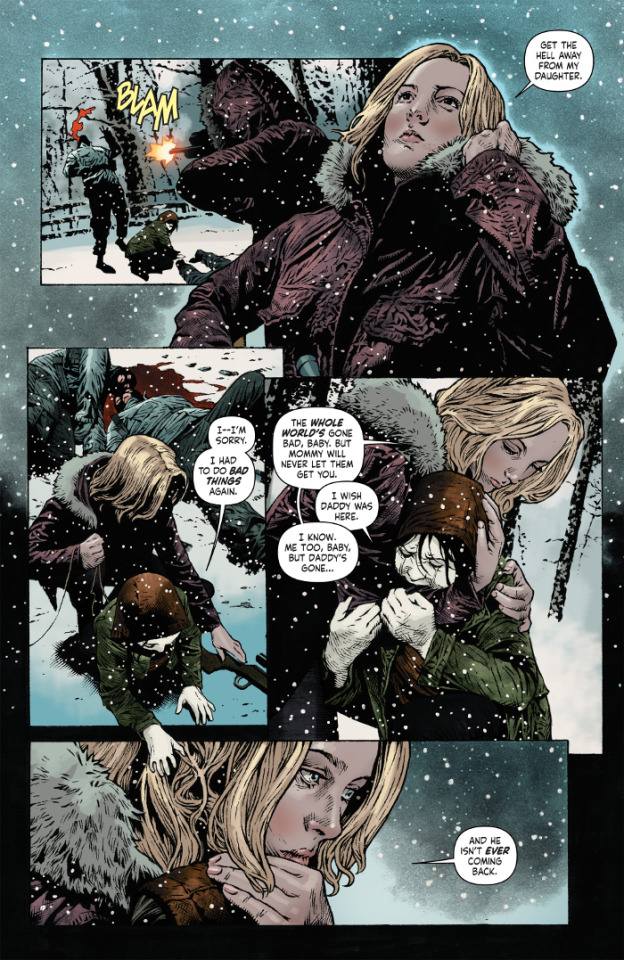

Bloodshot Salvation is off to a great start.
I loved Jeff Lemire’s previous work on Bloodshot Reborn and Bloodshot USA, and it comes as no surprise that he continues to produce a compelling story in this new incarnation. This first issue splits the narrative into two timeframes, one dealing with Bloodshot’s attempt at domestic bliss as Ray Garrison raising his newborn daughter, Jessie, with Magic and the other seeing Magic and Jessie at some point in the future, running for their lives.
The present sequence allows Lemire to play to one of his strengths, family. Some of his best work, including Essex County, Animal Man, and Royal City, focuses on different family dynamics and that really comes to the fore as Ray tries his best at being a good family man. It also allows Bloodhound to steal some of the spotlight as they navigate a humorous sequence of discovering that Jessie’s diaper needs to be changed. There’s also a kind of introduction to Magic’s father and the start of something new from the ashes of Project Rising Spirit, Project Omen, that feeds into the future sequences. It’s agents of this Project Omen that seem to be dogging Magic and Jessie in the future.
Splitting the art chores are Lewis LaRosa and Mico Suayan. LaRosa taking the present and Suayan the future, and the book overall looks gorgeous. I’d also really love to see a one shot from LaRosa just focusing on Bloodhound.
Quick Bits:
All-New Guardians of Galaxy #10 sees Rael confront the grand parade of lifeless packaging while trying to figure out those tricky erogenous zones.
Or not. This volume of Guardians of the Galaxy has been taking a kind of wide meandering route in order to get here in its main plot starting in the first issue, but Gerry Duggan finally brings the pieces together to set an even broader cosmic quest for the Guardians. It also throws out some explicit in-universe acknowledgement that some universal change has happened.
| Published by Marvel

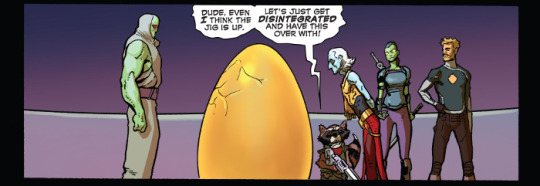

Avengers #11 is one of those quiet, character-driven stories that come after big events, transitioning from the end of Secret Empire and the dissolution of Parker Industries in ASM, to what’s to come next as part of Marvel Legacy.
| Published by Marvel



Big Trouble in Little China: Old Man Jack #1 is fun. Even if for some bizarre reason you’ve never seen Big Trouble in Little China this is enjoyable. John Carpenter teams up with Borderlands-writer, Anthony Burch, for this series and it captures both the weird-funny of Carpenter and some of the more social more-based humour that Burch tends to work into his writing, made particularly clear in the level of hell that is the “Hell for Dudes who Creep on Women”.
| Published by BOOM! Studios



Critical Role: Vox Machina - Origins #1 is a digital-first comics adaptation of Geek & Sundry’s podcast/stream of Critical Role, a D&D campaign DM’ed by Matt Mercer with an all-star cast of voice actors. It’s definitely different seeing the characters starting out in this form, and naturally has to drop the Dungeons & Dragons-specific setting, but it’s still an enjoyable fantasy story. Matthew Colville manages nicely to capture the humour and atmosphere of the web series and sets up an interesting mystery to begin with. The artwork from Olivia Samson is great.
| Published by Dark Horse



Dark Ark #1 is a killer concept. It sets up another ark in the Biblical Deluge, one carrying all of the beasts from the unnatural or supernatural world, including unicorns, manticores, vampires, etc. Naturally, “evil” creatures can’t seem to get along for long and it looks like bloodshed is about to break out. Cullen Bunn and Juan Doe do a really great job setting up this one. I’m excited to see what comes next.
| Published by Aftershock

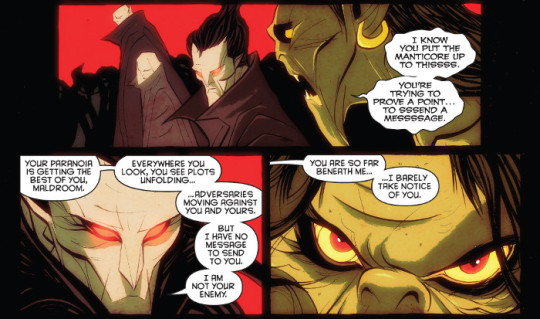

Doctor Strange #25 is a single-issue story from John Barber split into past and present sequences illustrated by Kevin Nowlan and Juan Frigeri respectively. It’s very nice to see Nowlan do some interior Strange art, even if the veritable legion of inkers make it a bit distracting. The art from Frigeri is also very nice. I know that you could argue that with Donny Cates and Gabriel Hernandez Walta starting their run after the next issue, this could be considered as inconsequential, but it still deals with some of the ramifications of the change of nature in how Marvel’s magic works and how Strange has grown as a person, so it is still an enjoyable story in its own right.
| Published by Marvel



Gasolina #1 is probably going to be airing on Amazon in the not too distant future. That’s not to say that it’s definitely going to be one of the properties put forward for the “television” deal, but it certainly feels like the kind of thing that’s going to make its way to some kind of mass media.
It’s decent, but I’m not quite sold on it yet. The art from Niko Walter is very good, often dark, but a little more natural here than on Demonic, probably because Mat Lopes is using a brighter, more expansive colour scheme. It reminds me even more of the style that Paul Azaceta has adopted for Outcast.
Sean Mackiewicz’ story, though, I like it, but I feel like I need more. That’s both good and bad. The characters are introduced, a plot is given in regards to a missing child, and there’s a kind of resolution to the end of the issue--which is actually kind of impressive and appreciated that there is a “complete” story in a fashion--but the overall hook isn’t really there yet. There’s something about bugs and weird creatures, odd deaths, but it seems like it’s skirting the story rather than drawing me in. I’ll still give the series a bit to grow on me, but it hasn’t grabbed me entirely.
| Published by Image / Skybound



Generations: The Marvels #1 features some really nice art from Paolo Villanelli with colours by Ian Herring that give the art a dated period feel to it. Sending Kamala Khan back into what is more likely the ‘70s feels a bit weird, though, given that Marvel tends to use a sliding scale for the timeline. It does manage to make the Generations event feel even weirder with what little explanation we’ve seen and in comparison to the other books.
| Published by Marvel



Half Past Danger 2: Dead to Reichs #1 is good old-fashioned Rocketeer-style adventure fun. The artwork from Stephen Mooney is absolutely beautiful.
| Published by IDW

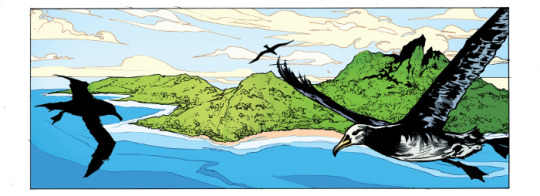

Jean Grey #7 is weird. Continuing Young Jean’s story of self-discovery in order to prevent the coming of the Phoenix, this issue features a guest appearance by Scarlet Witch, giving more advice to Jean in hope to cope, but at the same time the spirit haunting her, ostensibly Old Jean, gets more frustrated. What’s weird is that, to me at least, Old Jean doesn’t really seem like Old Jean. Something just seems to be off. I don’t know if that’s Dennis Hopeless’ intent, we’ll probably see in future issues, but I’m not sure if Old Jean is really Old Jean.
What isn’t weird is that Alberto Jiménez Alburquerque’s art is great to see here. He’s got a nice angular style that reminds me a bit of a refined Adam Pollina and it perfectly fits the tone of the book.
| Published by Marvel

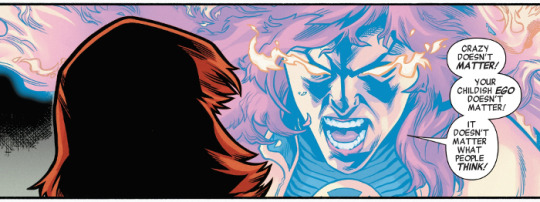

Journey to Star Wars: The Last Jedi - Star Wars: Captain Phasma #2 is every bit as beautiful as the first issue, possibly more so. This is just absolutely beautiful artwork from Marco Checchetto and Andres Mossa. The story also takes an interesting turn fleshing out the Stormtrooper aiding Phasma in her quest to track down Rivas and expanding a new world and its inhabitants in the SW canon.
| Published by Marvel



Kill the Minotaur #4 sees both an origin of the Labyrinth and the Minotaur as well as a confrontation between our erstwhile band of “heroes” and the beast. Theseus is still a complete asshole.
| Published by Image / Skybound

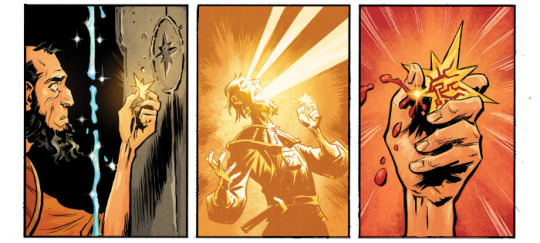

Killer Instinct #1 was interesting. I know nothing about the video game, have never played it, but was drawn to this by Ian Edginton as the writer. It’s not bad. Basically following some sort of cataclysmic battle with a profound evil, the world is left ruined with roving bands of monsters and marauders. The art from Cam Adams is also pretty good.
| Published by Dynamite



Misfit City #5 continues to be a fun adventure story like The Goonies but with a mostly girl cast. We get more advancement on the treasure hunt and some exposition on Mary and her ship.
| Published by BOOM! Entertainment / Boom! Box

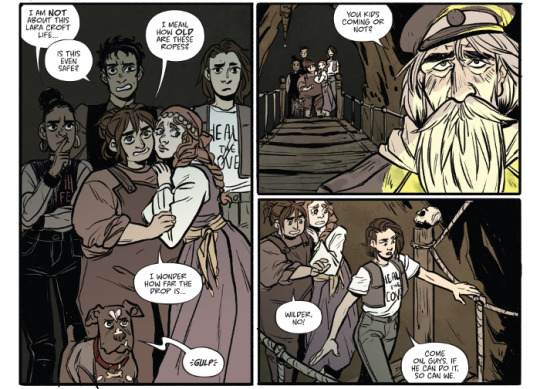

Royals #8 brings to a conclusion this leg of the Inhumans’ quest for Terrigen and the Universal Inhumans visit. Overall, the story and art have been great, but this issue the flashbacks are a bit weird. The old, old Inhumans costume designs are used and it’s strange. While the caption says “months ago”, the costumes suggest before New Atillan was even a thing.
| Published by Marvel



Secret Weapons #4 concludes this very excellent series that introduced us to a new set of players in the Valiant universe. The artwork from the team of Raúl Allén and Patricia Martín has been nothing short of the expected phenomenal, at times bordering on brilliant on how page layouts and panel compositions are constructed. While Eric Heisserer’s story is certainly no slouch either, it makes me wonder if I’m going to enjoy Secret Weapons #0 as much without this art team.
| Published by Valiant



Star Wars: Poe Dameron #19 makes me think that somehow Angel Unzueta has managed to level up his art again. Since starting on this series, his art has just been getting better and better and I swear that this “War Stories” arc is just next level. Part of it is decidedly the excellent colour work from Arif Prianto, but this is just gorgeous work.
| Published by Marvel

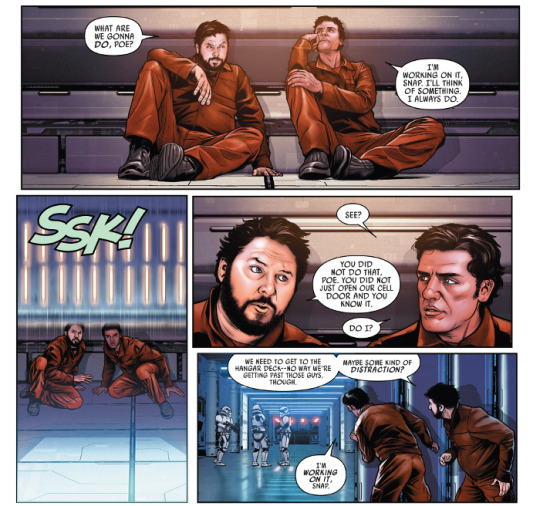

Unholy Grail #3 continues one of the stranger retellings of the Arthurian legend. Cullen Bunn has recast the story as a horror and it takes another tragic turn this issue with the wedding of Arthur and Guinevere. As usual, the artwork from Mirko Colak is a delight.
| Published by Aftershock



Other Highlights: Bitch Planet: Triple Feature #4, Black Hammer #13, Black Eyed Kids #14, Dept. H. #18, Descender #24, Generation Gone #3, GI Joe: First Strike #1, Glitterbomb: The Fame Game #1, Go Go Power Rangers #3, Head Lopper #7, Horizon #14, The Librarians #1, Luke Cage #5, Magnus #4, Micronauts: Wrath of Karza #5, Mirror #8, Monsters Unleashed #6, Night’s Dominion: Season Two #2, Savage Town, Shirtless Bear Fighter #4, Son of Shaolin, Star Trek: Boldly Go #11, Star Wars Annual #3, Star Wars Adventures #2, The Totally Awesome Hulk #23, The Unsound #4, US Avengers #10, Venomverse #3, Violent Love #8, Wayward #23, World of Animosity #1
Recommended Collections: East of West - Vol. 7, The End League - Library Edition, Jeff Steinberg, The Last Days of American Crime, Moon Knight - Vol. 3: Birth & Death, Power Man & Iron Fist - Vol. 3: Street Magic, Reggie & Me, Sons of the Devil - Vol. 3
0 notes